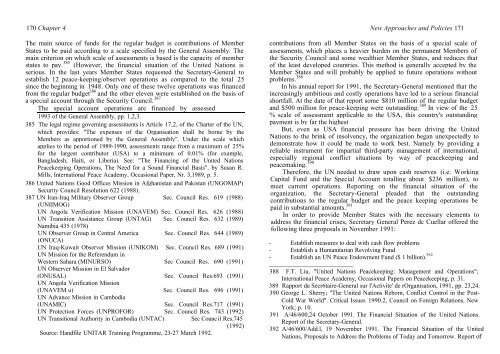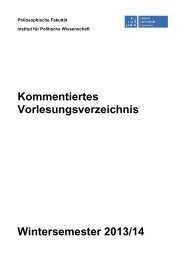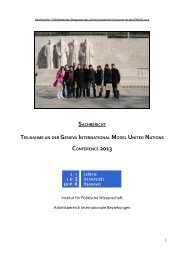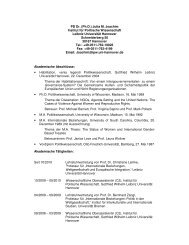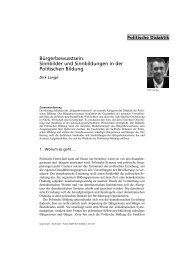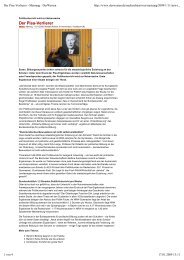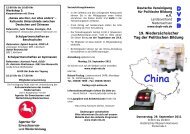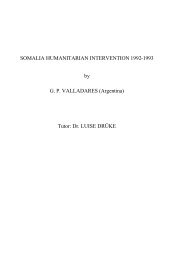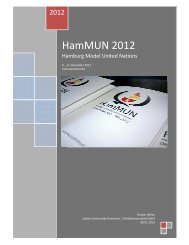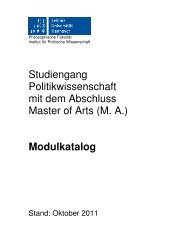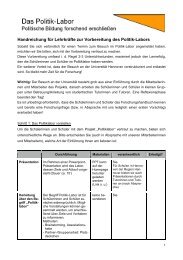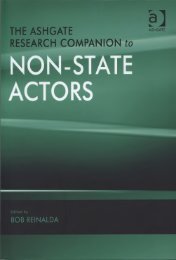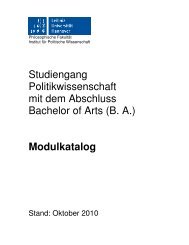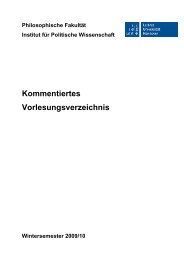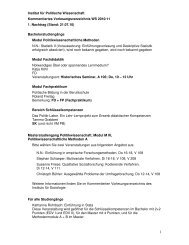Preventive Action for Refugee Producing Situations
Preventive Action for Refugee Producing Situations
Preventive Action for Refugee Producing Situations
Create successful ePaper yourself
Turn your PDF publications into a flip-book with our unique Google optimized e-Paper software.
170 Chapter 4<br />
The main source of funds <strong>for</strong> the regular budget is contributions of Member<br />
States to be paid according to a scale specified by the General Assembly. The<br />
main criterion on which scale of assessments is based is the capacity of member<br />
states to pay. 385 (However, the financial situation of the United Nations is<br />
serious. In the last years Member States requested the Secretary-General to<br />
establish 12 peace-keeping/observer operations as compared to the total 25<br />
since the beginning in 1948. Only one of these twelve operations was financed<br />
from the regular budget 386 and the other eleven were established on the basis of<br />
a special account through the Security Council. 387<br />
The special account operations are financed by assessed<br />
1993 of the General Assembly, pp. 1,2,3.<br />
385 The legal regime governing assessments is Article 17,2, of the Charter of the UN,<br />
which provides: "The expenses of the Organisation shall be borne by the<br />
Members as apportioned by the General Assembly". Under the scale which<br />
applies to the period of 1989-1990, assessments range from a maximum of 25%<br />
<strong>for</strong> the largest contributor (USA) to a minimum of 0.01% (<strong>for</strong> example,<br />
Bangladesh, Haiti, or Liberia). See: "The Financing of the United Nations<br />
Peacekeeping Operations, The Need <strong>for</strong> a Sound Financial Basis", by Susan R.<br />
Mills, International Peace Academy, Occasional Paper, Nr. 3,1989, p. 5.<br />
386 United Nations Good Offices Mission in Afghanistan and Pakistan (UNGOMAP)<br />
Security Council Resolution 622 (1988).<br />
387 UN Iran-Iraq Military Observer Group Sec. Council Res. 619 (1988)<br />
(UNIIMOG)<br />
UN Angola Verification Mission (UNAVEM) Sec. Council Res. 626 (1988)<br />
UN Transition Assistance Group (UNTAG) Sec. Council Res. 632 (1989)<br />
Namibia 435 (1978)<br />
UN Observer Group in Central America Sec. Council Res. 644 (1989)<br />
(ONUCA)<br />
UN Iraq-Kuwait Observer Mission (UNIKOM) Sec. Council Res. 689 (1991)<br />
UN Mission <strong>for</strong> the Referendum in<br />
Western Sahara (MINURSO) Sec Council Res. 690 (1991)<br />
UN Observer Mission in El Salvador<br />
(ONUSAL) Sec. Council Res.693 (1991)<br />
UN Angola Verification Mission<br />
(UNAVEM u) Sec. Council Res. 696 (1991)<br />
UN Advance Mission in Cambodia<br />
(UNAMIC) Sec. Council Res.717 (1991)<br />
UN Protection Forces (UNPROFOR) Sec. Council Res. 743 (1992)<br />
UN Transitional Authority in Cambodia (UNTAC) Sec Counc il Res.745<br />
(1992)<br />
Source: Handfile UNITAR Training Programme, 23-27 March 1992.<br />
New Approaches and Policies 171<br />
contributions from all Member States on the basis of a special scale of<br />
assessments, which places a heavier burden on the permanent Members of<br />
the Security Council and some wealthier Member States, and reduces that<br />
of the least developed countries. This method is generally accepted by the<br />
Member States and will probably be applied to future operations without<br />
problems. 388<br />
In his annual report <strong>for</strong> 1991, the Secretary-General mentioned that the<br />
increasingly ambitious and costly operations have led to a serious financial<br />
shortfall. At the date of that report some $810 million of the regular budget<br />
and $500 million <strong>for</strong> peace-keeping were outstanding. 389 In view of the 25<br />
% scale of assessment applicable to the USA, this country's outstanding<br />
payment is by far the highest<br />
But, even as USA financial pressure has been driving the United<br />
Nations to the brink of insolvency, the organization began unexpectedly to<br />
demonstrate how it could be made to work best. Namely by providing a<br />
reliable instrument <strong>for</strong> impartial third-party management of international,<br />
especially regional conflict situations by way of peacekeeping and<br />
peacemaking. 390<br />
There<strong>for</strong>e, the UN needed to draw upon cash reserves (i.e. Working<br />
Capital Fund and the Special Account totalling about $236 million), to<br />
meet current operations. Reporting on the financial situation of the<br />
organization, the Secretary-General pleaded that the outstanding<br />
contributions to the regular budget and the peace keeping operations be<br />
paid in substantial amounts. 391<br />
In order to provide Member States with the necessary elements to<br />
address the financial crises, Secretary General Perez dc Cuellar offered the<br />
following three proposals in November 1991:<br />
- Establish measures to deal with cash flow problems<br />
- Establish a Humanitarian Revolving Fund<br />
- Establish an UN Peace Endowment Fund ($ 1 billion). 392<br />
___________________________<br />
388 F.T. Liu, "United Nations Peacekeeping: Management and Operations";<br />
International Peace Academy, Occasional Papers on Peacekeeping, p. 31.<br />
389 Rapport du Secr6taire-General sur l'Activite' de rOrganisation, 1991, pp. 23,24.<br />
390 George L. Sherry; "The United Nations Reborn, Conflict Control in the Post-<br />
Cold War World". Critical Issues 1990.2, Council on Foreign Relations, New<br />
York; p. 10.<br />
391 A/46/600,24 October 1991. The Financial Situation of the United Nations.<br />
Report of the Secretary-General.<br />
392 A/46/600/Add.l, 19 November 1991. The Financial Situation of the United<br />
Nations, Proposals to Address the Problems of Today and Tomorrow. Report of


